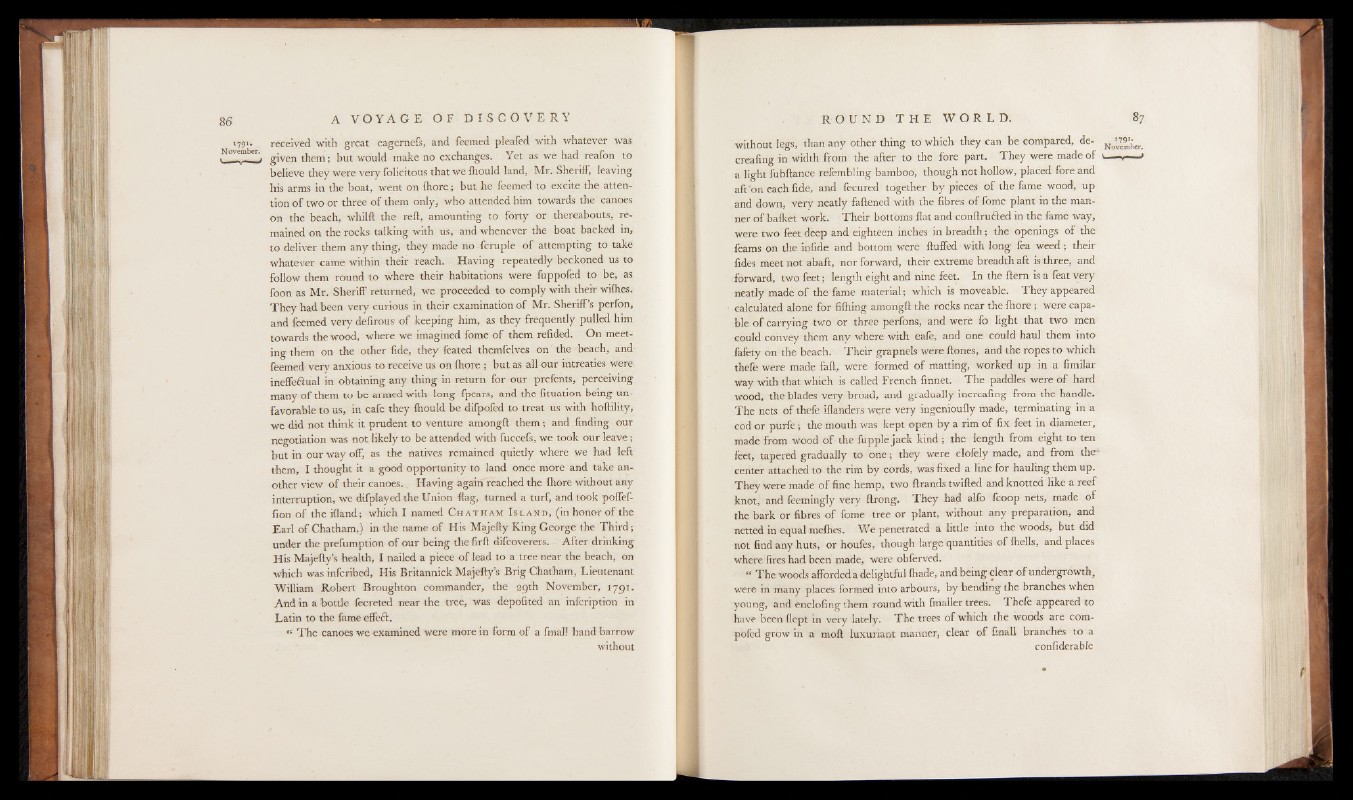
received with great eagernefs, and feemed pleafed with whatever was
given them; but would make no exchanges. Yet as we had real on to
believe they were very folicitous that we fhould land, Mr. Sheriff, leaving
his arms in the boat, went on fhore; but he feemed to excite the attention
o f two or three o f them only, who attended him towards the canoes
on the beach, whilft the reft, amounting to forty or thereabouts, remained
on the rocks talking with us, and whenever the boat backed in,
to deliver them any thing, they made no fcruple of attempting to take
whatever came within their reach. Having repeatedly beckoned us to
follow them round to where their habitations were fuppofed to be, as
foon as Mr. Sheriff returned, we proceeded to comply with their wilhes.
They had been very curious in their examination of Mr. Sheriff’s perfon,
and feemed very defirous o f keeping him, as they frequently pulled him
towards the wood, where we imagined fome o f them refided. On meeting
them on the other fide, they feated themfelves on the beach, and
feemed very anxious to receive us on fhore ; but as all our intreaties were
ineffeftual in obtaining any thing in return for our prefents, perceiving
many of them to be armed with long fpears, and the fituation being unfavorable
to us, in cafe they fhould be difpofed to treat us with hoftility,
we did not think it prudent to venture amongft them; and finding our
negotiation was not likely to be attended with fuccefs, we took our leave;
but in our way off, as the natives remained quietly where we had left
them, I thought it a good opportunity to land once more and take another
view of their canoes. _ Having again'reached the fhore without any
interruption, we difplayed the Union flag, turned a turf, and took poffef-
fion o f the ifland; which I named C h a t h a m I s l a n d , (in honor of the
Earl of Chatham,) in the name of His Majefty King George the Third;
under the prefumption of our being the firft difcoverers. After drinking
His Majefty’s health, I nailed a piece o f lead to a tree near the beach, on
which was infcribed, His Britannick Majefty’s Brig Chatham, Lieutenant
William Robert Broughton commander, the 29th November, 1791.
And in a bottle fecreted near the tree, was depofited an infcriptkm in
Latin to the fame effefl.
* The canoes we examined were more in form of a final! hand barrow
. ' without
without legs, than any other thing to which they can be compared, decreafing
in width from the after to the fore part. They were made of <--- ,— ■>
a light fubftance refembling bamboo, though not hollow, placed fore and
aft’on each fide, and fecured together by pieces of the feme wood, up
and down, very neatly faftened with the fibres of fome plant in the manner
of bafket work. Their bottoms flat and conftruHed in the feme way,
were two feet deep and eighteen inches in breadth; the openings of the
Teams on the infide and bottom were fluffed with long fea weed; their
fides meet not abaft, nor forward, their extreme breadth aft is three, and
forward, two feet; length eight and nine feet. In the ftern is a feat very
neatly made of the fame material; which is moveable. They appeared
calculated alone for fifhing amongft the rocks near the fhore; were capable
of carrying two or three perfons, and were fo light that two men
could convey them any where with eafe, and one could haul them into
fafety on the beach. Their grapnels were ftones, and the ropes to which
thefe were made faft, were formed o f matting, worked up in a fimilar
way with that which is called French linnet. The paddles were o f hard
wood, the blades very broad, and gradually increafing from the handle.
The nets of thefe iflanders were very ingenioufly made, terminating in a
cod or purfe; the mouth was kept open by a run of fix feet in diameter,
made from wood of the fupplejack kind ; the length from eight to ten
feet, tapered gradually to one; they were clofely made, and from the'
center attached to the rim by cords, was fixed a line for hauling them up.
They were made of fine hemp, two ftrands twifted and knotted like a reef
knot, and feemingly very ftrong. They had alfo fcoop nets, made of
the bark or fibres of fome tree or plant, without any preparation, and
netted in equal mefhes. We penetrated a little into the woods, but did
not find any huts, or houfes, though large quantities of fhells, and places
where fires had been made, were obferved.
“ The woods afforded a delightful fhade, and being clear o f undergrowth,
were in many places formed into arbours, by bending the branches when
young, and enclofing them round with fmaller trees. Thefe appeared to
have been flept in very lately. The trees o f which the woods are com-
pofed grow in a moft luxuriant manner, clear of fmall branches to a
confiderable